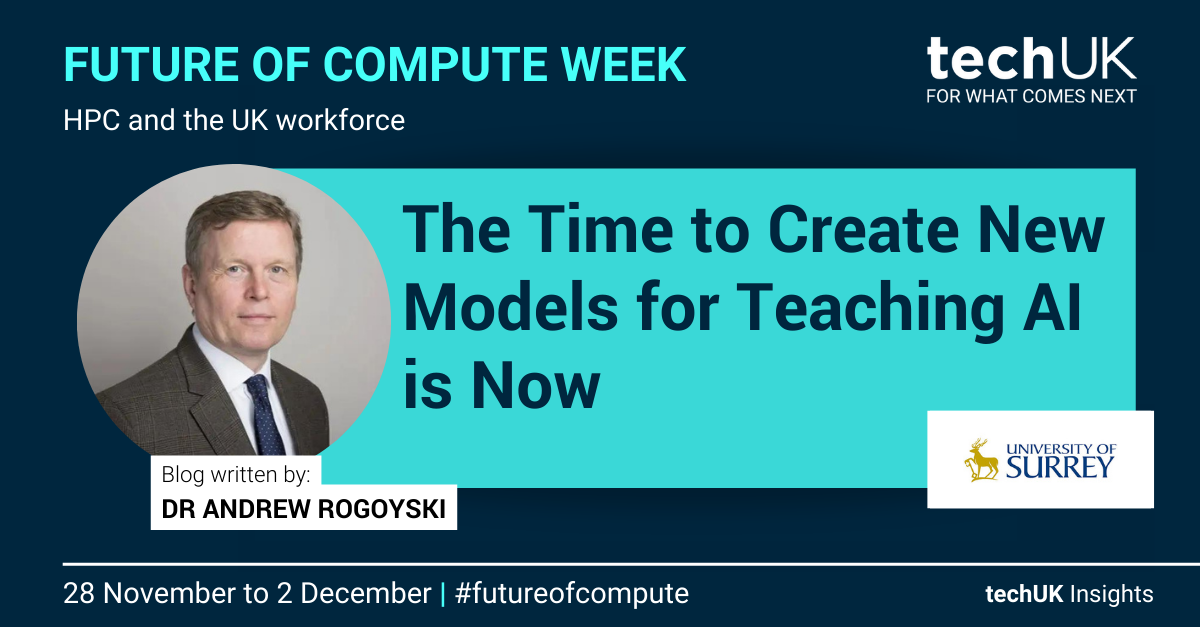The Time to Create New Models for Teaching AI is Now

In October’s House of Lords Science & Technology Committee session on the ongoing inquiry on People and Skills in UK Science Technology Engineering and Mathematics (STEM), Robert West, Head of Education and Skills at the CBI stated ‘upskilling and reskilling are the biggest games in town”, citing it as one of the UK Government’s missions described in the White Paper on Levelling Up. This reflection is key to understanding how the UK (and many developed nations) will address the growing skills gaps in STEM. Anecdotally and evidentially, companies are crying out for qualified staff with skills in a range of digital skills including AI (Artificial Intelligence), high performance computing (HPC), data science and cyber security. While we undoubtedly need to encourage more students to take up STEM subjects, we also need to recognise that much more could be immediately delivered through the up-skilling and re-skilling of experienced people already in the workforce.
This topic is particularly close to the hearts of many universities delivering education in AI which in turn requires skills in computer science, HPC and other related topics. According to the OECD Policy Observatory on AI, over 60 countries have published over 800 policy instruments related to AI, illustrating the importance of the field and the need to drive capacity to deliver AI into an ever increasing number of market sectors. It is equally clear that the most significant barrier to AI adoption is the shortage of people with AI skills and the associated skills of HPC, data science and cyber security, reflecting the need to develop new mechanisms to deliver such education to a much wider set of students. According to the 2021 Ipsos MORI report for DCMS on “Understanding the UK AI labour market: 2020”, there were over 110,000 job postings in AI and data science in 2020, with over 50% requiring a degree, most commonly in STEM subjects. In their analysis, they found that 54% of company’s AI specialists had PhDs, a very high barrier to entry to an area in such high demand.
In the US, the insatiable demand for AI-related doctorates has meant that over 20% of computer science PhDs are now in AI. There are further challenges related to the dependence of AI on high performance computing, especially the architecting of massive GPU clusters. The demand for such skills has led to aggressive recruitment among companies, leading to salary inflation and high levels of staff churn. It has even led to problems in parts of academia with large numbers of academics in some universities, including Carnegie Mellon, Georgia Institute of Technology and University of Washington, choosing to make the jump to industry. Even highly successful AI research groups, producing dozens of AI PhDs every year, are barely making a dent in the demand.
One of the long-term solutions to the skills drought in AI, Data Science, HPC and related skills, is to push the education of such topics to points earlier and later in the education chain. Many universities already offer strong research degrees in AI, strong Masters courses in AI (including conversation courses for non-STEM graduates), often underpinned by knowledge of HPC, cyber and other essential skills. Some undergraduate degrees which include AI such topics, but there it stops. Introducing these complex subjects into secondary education is desirable but hard because of the complexity and breadth of topics which need to be taught. Therefore the obvious area to explore is the opportunity to provide education opportunities to people already enjoying technical careers in IT or where domain expertise in areas like healthcare, banking, energy production, etc can be augmented by the addition of these high-end skills. There are multiple challenges here, including how to compress large topics like AI into modular, flexible and immediately practical courses, ideally with some formal recognition and consistency between course providers. Online courses offer some hope but there is no substitute (yet) for face to face time with expert practitioners.
One of the critical enablers for this change is to develop stronger engagement between education providers and the companies developing and using these technologies so that courses are shaped and adapted to meet real-world needs. This is particularly important in AI because of the volume of leading-edge work originating in industry, coupled with the sheer pace and scale of commercial development in AI backed by billion-dollar budgets of the Silicon Valley supergiants. Disruptive models are starting to emerge such as Xavier Neil’s Ecole 42 teacherless peer-to-peer school for computer science, bypassing the need for academic educators completely. There is also the growing possibility of using AI to improve education delivery in these topic areas, allowing courses to be personalised and adapted according to the student’s needs, experience, learning styles, etc. The time to engage with this topic is now and the implications of getting it right (or wrong) will have significant impact on our future societies, economies and lives.

Rory Daniels
Rory joined techUK in June 2023 after three years in the Civil Service on its Fast Stream leadership development programme.

Ella Shuter
Ella joined techUK in July 2025 as Junior Programme Manager for Emerging Technologies.

Laura Foster
Laura is techUK’s Associate Director for Technology and Innovation.

Elis Thomas
Elis joined techUK in December 2023 as a Programme Manager for Tech and Innovation, focusing on Semiconductors and Digital ID.


